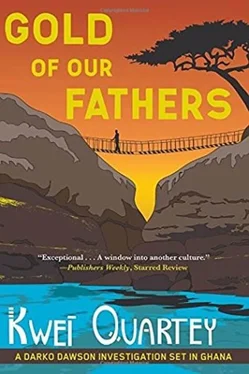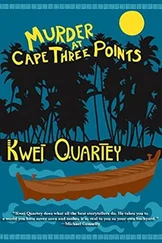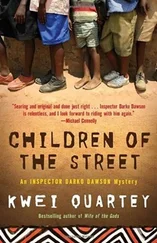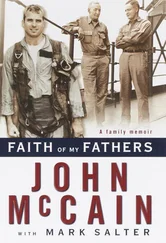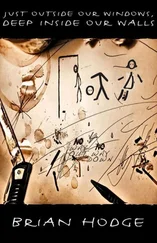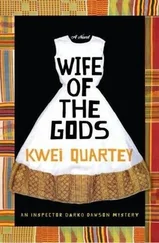Dawson was trying to get a grasp of how much-or small-that amount of gold could be. “How much can the workers make?” he asked Obeng.
Obeng shrugged. “Most days just a few cedis . Sometimes nothing. Don’t forget, the owner takes most of the profit. But what is sad, sir, is that the tiny amount these boys earn is more than they made in the hometowns they came from. So this is why they stay, doing this dangerous work.”
It was a stark truth. Elsewhere in Ghana, street children eked out a meager living in urban centers like Accra, and they had similar stories: no work, and nothing to do in the villages they hailed from.
As Dawson watched the dredging, he reflected that he found this method of gold mining most intimidating because he could not swim and had an abiding fear of deep water. He spotted an eddy around the sandbar adjacent to the barge, which to him meant that a person could be swept away into the clutches of the wider river as it gathered strength and depth farther downstream.
One of the guys on the sandbar spotted Obeng, waved at him, and started his way toward them by plunging into the water between the bar and the bank. The level reached the top of his chest, even though he was quite tall, and Dawson could tell that the current was exerting a pull. He shuddered.
The depth of the river at the crossing point the man had chosen wasn’t the only thing that caught Dawson’s attention. The man had slipped off his shorts, left them at the sandbar and crossed the river stark naked, emerging completely exposed and in full view of his coworkers. He swept excess water off his body and sauntered to a clump of rocks to put on another pair of shorts waiting for him. Evidently this was the norm and galamsey boys were not in the least bit bashful. The man, in his early twenties, called out to Obeng with a familiarity that demonstrated that they knew each other, and walked in their direction with the same casual gait.
“Please, we can go down,” Obeng said to Dawson.
From where they stood, the drop to river level was a few meters, and steep, so they had to jump, their feet imprinting the soft, squelchy loam. They covered the rest of the way to meet Obeng’s friend, whose name was Brave. He was lean and muscled from hard physical work and rather fair colored with a broad, flat face. He and Obeng shook hands, snapped fingers, and traded a couple pleasantries, and then Obeng introduced him to Dawson.
“Akwaaba,” Brave said in Twi.
But Dawson had guessed he was Ewe because Ewes loved names like “Marvelous,” “Beauty,” “Grace,” and “Charity.” He replied to Brave in Ewe.
Brave laughed, slapping palms with Dawson in delight. “Are you Ewe?”
“Half Ewe, half Fante.”
“Oh, wonderful.”
But to be fair to Obeng, who didn’t speak Ewe, Dawson and Brave went back to Twi, the default Ghanaian language.
“You know Kudzo Gablah, right?” Obeng asked Brave.
He nodded. “Yes please. He’s from Keta, my hometown.”
“We’re looking for him.”
“Is that so? Please, isn’t he working at Dunkwa?”
Obeng shook his head. “Nana Akrofi said he came to Aniamoa, so we thought maybe he was at this site.”
“Oh, okay,” Brave said. “He used to be with us, but no longer.”
An older man came up to them who turned out to be the foreman.
“I have all my papers,” the foreman said defensively in response to the detectives’ inquiries about Kudzo. “This is a legal site, and I don’t deal with troublesome boys like that Gablah. I told him a long time ago that I didn’t want him working here.”
“Relax,” Dawson said with a smile. “It’s not you we are investigating. Why did you not want Kudzo working with you?”
“Hot temper,” the foreman said in English. “ Too hot. He fought with me; he fought with all these guys.” He gestured to his workers. “I don’t know what is wrong with him.”
“I see,” Dawson said, wondering if this was going to be a short case. Did Kudzo kill Bao in a fit of anger?
“Please,” the foreman said, switching back to Twi, “if you think he’s around the Aniamoa area, then you should go into the town and ask.”
“We will do that,” Dawson said. “Thank you.”
“You are welcome.” The foreman turned away. Dawson could tell that he wanted as little as possible to do with this investigation.
Brave accompanied them part of the way back up out of the river depression, showing them a much easier path than the way they had come.
“So is your group of miners Ghanaian-operated?” Dawson asked Brave.
“Please, no. A certain Chinese man owns it.”
“Sometimes you won’t see any Chinese at the site,” Obeng explained to Dawson. “The Ghanaian authorities have started to pay more attention to illegal mining so Chinese owners put a Ghanaian front man there so that people coming around won’t become suspicious.” He gave a hard ironic smile. “These China people aren’t stupid at all.”
Once Brave had bid them goodbye, Dawson asked Obeng a question that persisted in his mind. “I’m curious-is this site really legal the way the foreman said?”
Obeng laughed. “Don’t mind him. No dredge mining is legal in Ghana. It is spoiling our rivers. Do you see how the water is colored that ugly brown?”
“Yes.”
“That’s not how it’s supposed to be. That is all the pollutants making it like that. Now, imagine not just ten or twenty of these barges dredging, but hundreds and hundreds of them all along Ghana’s rivers. How will our rivers survive, and the fish in the rivers, and the people who eat the fish and drink the water? And what can the government do? Nothing.”
Obeng and Dawson fell silent as they returned to the taxi and considered the sheer magnitude of a problem that seemed to have grown larger than anyone could handle.
Back in the taxi, they went on to Aniamoa. It was smaller than Dunkwa, a large village rather than a town. A group of boys was playing soccer in a dusty field devoid of grass and full of dips and rises that the boys negotiated as if it were second nature.
Since Aniamoa was where he grew up, Obeng knew a lot of people there, and as they alighted from the vehicle he was already calling out and waving to several. He and Dawson stopped by four men playing cards and asked them if they knew Kudzo Gablah. After some discussion, they decided they had seen him earlier on and pointed vaguely in one direction. Following that lead, Dawson and Obeng moved on. A skinny tan-colored dog resting under a tree watched them with interest and decided to follow them. Goats wandered about or stood placidly chewing whatever goats chew.
“I’ll ask these women,” Obeng said, indicating a young woman in front of a house pounding fufuo while her synchronized partner turned the glutinous mass in the mortar with the same rhythm.
“Dabi,” she said, shaking her head without breaking her rhythm. “We don’t know anyone by that name.”
Something about the way she said that alerted Dawson. He looked around and spotted a young man appearing from behind the wall of the next house and then ducking quickly back when he saw the two detectives. Dawson touched Obeng on the shoulder and beckoned him to follow as he walked quickly toward the target house.
“I saw a guy just now,” he told Obeng quietly. “I think it was him.”
Dawson didn’t know what Kudzo looked like, and he could be wrong, but he didn’t think so. He signaled Obeng to circle round in one direction while he went the other. When he got to the back wall of the house, Dawson peeped around it and saw the young man on the lookout, his head craned the other way. Dawson stepped out quietly from behind the wall. “Kudzo Gablah?”
Читать дальше
